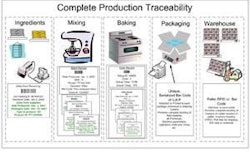If you've ever doubted that today's consumers are empowered and concerned, consider this:
- Three-fourths of US shoppers say they feel in control and have an impact on their own health, according to the 2008 HealthFocus Trend Survey;
- 80% of consumers say they are knowledgeable about health and nutrition issues (same survey, reported in the August 2009 issue of FoodTechnology); and
- Six in 10 Americans worry about food safety, according to Mintel.
With pets elevated to full family member status, is it any wonder their owners approach pet care and feeding with the same mindset? Combine that with hyper-awareness of the 2007 and subsequent petfood recalls, and you have the perfect recipe for involved pet owners who not only want, but demand, to know everything possible about petfood products, ingredients and processing.
Sometimes this involvement allows petfood manufacturers and the industry to shine; sometimes it puts companies in the cross hairs, particularly if it rises to the level of activism. What's the best way to respond?
I've posed this question in various ways over the past few months-on the Petfood-Connection.com blog and to a few individuals within and outside the industry. The feedback provides a lot of food for thought, but one theme stands out strong and clear: the need to be proactive, forthright and transparent.
The educated consumer
"The average consumer isn't an extreme activist at all," says Melody McKinnon, owner of AllNaturalPetCare.com, a new site offering information about natural pet products that will soon have products for sale. "What the pet industry has to face is the educated consumer. The Internet has allowed consumers to become educated and aware in record time."
McKinnon, based in British Columbia, Canada, describes herself as both a "proactivist" and a member of the pet industry. She adds: "Awareness and education are always positive. Consumers are able to make educated choices, resulting in more healthy pets and a thriving industry. They are more than willing to spend good money for good products to ensure a healthy companion animal."
Others in the industry also see positives with increased consumer involvement. "Communication among consumers can be helpful for manufacturers that have good products that perform," says Roman Versch, president of the Pet Depot chain of pet stores (based in Glendora, California, USA) and soon-to-launch Seasons Pet Food . "Blogs about pets with improved health due to better quality diets are sharing results with the world. Most consumers are trading up in nutritional quality, which means higher sales and profit."
Preying on fear
But most petfood industry professionals find many things wrong with this new level of consumer empowerment, especially when it expands into full-blown activism. "Caution is a good thing, it makes us ask questions. Fear is not a good thing," McKinnon says. "People prey on fear, and consumers are at risk of being drawn into a fear-mongering circle that is profiting from it. Extremists are often the result. The good news is most level-headed consumers will dismiss an extremist. Far more damaging are the fear opportunists; they're much more subtle and sly in planting seeds of doubt."
Versch describes what he sees as two classes of activist: One is genuinely interested and concerned about pet nutrition; the others, often referred to as consumer activists, seek monetary gain. He believes this latter group sometimes includes attorneys looking to capitalize on recalls. "After having a taste of blood from the melamine recalls (a scandal initiated by human deception), these attorney groups are setting up websites and blogs to build consumer legal recourse clubs, trying to develop something out of nothing in most cases. At play here is the emotional connection humans have with their pets."
Tom Willard, PhD, owner of Performance Foods (based in Broomfield, Colorado, USA) and an industry consultant, also places some blame with the legal profession. "Part of this comes from the way our legal system works," he says. "The admission of a problem or guilt most likely opens a company to product liability claims and endless lawsuits. Most companies' lawyers tell their clients not to admit guilt and to stall or put up a smoke screen when talking to the press."
Spreading like wildfire
Willard believes the media exacerbate the situation: "The press and news organizations, too, have an agenda many times, so often a negative spin is part of the story."
"On the Web, anyone can find all kinds of bad press regarding commercial foods," adds George C. Fahey, PhD, professor of animal and nutritional sciences at the University of Illinois at Urbana-Champaign, Illinois, USA. "And more pet owners than ever now believe they can do a better job of feeding their animals by preparing homemade diets. This, of course, is totally false, and many homemade diets are seriously deficient in nutrients."
Whether from traditional media or rapidly multiplying websites and blogs, agendas and other viewpoints spread like wildfire online. "In my opinion, this phenomenon seems to be limited to the Internet, with almost no reference by everyday consumers shopping at our stores," Versch says. "Misinformation is easily circulated and can be damaging to retailers and petfood manufacturers. How can a company keep up with the rapid, daily consumer opinions that might be posted?"
Tell the truth
Keeping up can be tough. "Some pet owners will distrust petfood no matter what the companies do or say," says Marion Nestle, PhD, professor of nutrition, food studies and public health at New York University in New York, New York, USA, and also a blogger ( www.foodpolitics.com ) and author (Pet Food Politics: The Chihuahua in the Coal Mine, University of California Press, 2008, and Feed Your Pet Right, Free Press/Simon & Schuster, due out May 2010). "Of course, pet illnesses occur for plenty of reasons other than what's in the food."
But there is hope, Nestle suggests: "Companies that take complaints seriously and treat customers with respect ought to do just fine in the long run. Be respectful, be honest, tell the truth. The rest will be easy."
"We have to earn respect and trust," McKinnon agrees. "To do that, we have to tell the consumer the truth. If our product is the best kibble out there because we process it at 50 degrees less than our competitors, then say so. Do what you can to make it the best kibble it can be, then market what makes it different. When consumers ask you if it contains fishmeal that is pre-processed at 200 degrees Celsius and it does, then tell them and tell them why it does."
Changes in order?
But McKinnon also believes manufacturers may need to consider changing their products or practices to meet increasing consumer demands. "If you can't give a consumer a straight answer about any facet of your product, you have to change that facet," she says. "Has your honesty resulted in complaints about your using high-heat processed fishmeal? Then it's time to source some freeze-dried salmon. Go ahead, mark up the price a few cents. If there's one thing we know about today's pet market, it's that pet owners will spend more for a truly premium product."
Willard advises changes, too. "We as an industry need to get our collective house in order and stop cutting corners. The most egregious error is when quality procedures are not followed. All procedures involving receiving, handling or storing ingredients are as important as the processing and handling of the finished products. Inspecting our suppliers is absolutely the first line of defense and must be followed to the letter."
Still, Willard infuses his advice with praise: "The petfood industry is one of the best in the world. We provide safe, reliable, efficacious and nutritious foods for millions of pets daily throughout the world. We need to always remember we serve two masters: the human customer and, most importantly, the pet. Both rely on each of us to do our best each day. We must follow the strictest QA and QC procedures and always take personal responsibility for each and every mistake before it becomes manna for the activists."


















